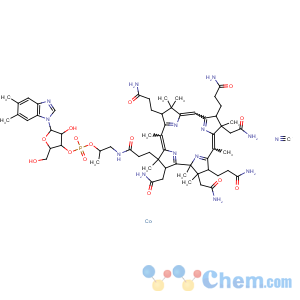Vitamin B12 /Skype:ling@chembj.com
-
- Product NameVitamin B12 /Skype:ling@chembj.com
- CAS No.68-19-9
- Purity99%
- Min Quantity5Metric Tons
- Price1~5

 View Contact Detail
View Contact Detail
-
 Molecular Structure
Molecular Structure
Detailed Description
Vitamin B12 /Skype:ling@chembj.comProduct Name: Vitamin B12
Synonyms: 5, 6-dimethyl-1-(3-o-phosphono-alpha-d-ribofuranosyl)-1h-benzimidazolmonoes; 5, 6-dimethylbenzimidazolylcobamidecyanide; 5, 6-dimethylbenzimidazolyl-co-cyanocobamide; Alpha-5, 6-dimethyl-1h-benzimidazolyl-cobamidcyanide; Anacobin; Berubigen; Betalin-12; Betalin12crystalline
Product Details:
Place of Origin: China
Certification: ISO9001
Brand: YuanCheng
Payment & Shipping Terms:
Minimum Order Quantity: 1kg
Supply Ability: 5000kg/month
Delivery Time: Within 24 hours after payment
Payment Terms: Western Union, MoneyGram, T/T
Port: China's main ports
Product Description:
CAS: 68-19-9
MF: C63H88CoN14O14P
MW: 1355.37
EINECS: 200-680-0
Mol File: 68-19-9. Mol
Package: 25kg/cardboard drum
Purity: 98%
Appearance: Deep red to red crystalline powder
Vitamin B12 consists of a class of chemically related compounds (vitamers), all of which have vitamin activity. It contains the biochemically rare element cobalt sitting in the center of planar tetra-pyrrole ring called a Corrin ring. Biosynthesis of the basic structure of the vitamin is accomplished only by bacteria and archaea (which usually produce hydroxocobalamin), but conversion between different forms of the vitamin can be accomplished in the human body.
Usage:
Prototype of the family of naturally occurring cobalt coordination compounds knows as corrinoids. Analogs of vitamin B12 which differ only in the β -ligand of the cobalt are termed cobalamins. Synthesi zed almost exclusively by bacteria. Dietary sources include fish, meat, liver, and dairy products; Plants have little or no cobalamins. Converted by the body into its bioactive forms, methylcobalamin and cobamamide, which serve as enzyme cofactors. Severe deficiency may result in megaloblastic anemia and/or neurological impairment.